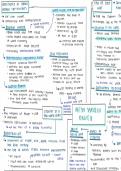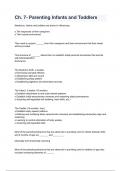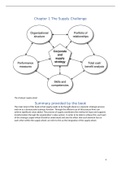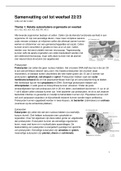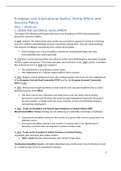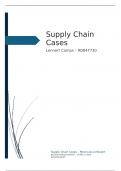CHAPTER II
Chapter II Theory
• Literature Review
o Background Theory
▪ Dynamic Capabilities
▪ Innovation Performance
THEORY
• Exploration
• Exploitation
▪ Institutions
• Government Effectiveness
• Indulgent/Restraint
- 12 -
, 2. Literature Review
2.1 Background Theory
Dynamic Capabilities (DCs)
Dynamic capabilities are defined as a "firm's ability to integrate, build and reconfigure
internal and external competencies to address rapidly changing environments" (Teece, Pisano,
& Shuen, 1997, p.516). In other words, DCs enable the firm to operate, extend, modify, and
create ordinary abilities that aid the firm in sustaining its CA (Winter, 2003; Helfat,1997;
Zahra, Sapienza, & Davidsson, 2006). DCs may also adjust the firm's RBV, indicating that an
effect of DCs on IP is accomplished through a firm's ability of resources management (Barney,
1991; Teece, 2008; Zhi & Peng, 2013) to gain CA (Ambrosini & Bowman, 2009). A similar
point of view was shared by another scholar who suggested that the enterprise's competitive
advantage and performance are gained through adequate allocation, identification, and
acquisition of resources (Eisenhardt & Martin, 2000).
However, it is important to observe that firms can differ significantly, especially in
terms of their internal knowledge4 and absorptive capacity 5, performing their activities
differently, as Eisenhardt and Martin (2000) emphasised. Yet, in contrast to Eisenhardt and
Martin (2000), whose typology of DCs reflects a set of different DCs such as strategic decision-
making, product development routines, resources allocation routines etc., Teece's (2007)
conceptualisation is broader and refers to the general firm capability of sensing, seizing, and
reconfiguring (Kump et al., 2019). Thus, Teece's (2007) general perspective will be adopted in
4 Internal knowledge can be identified in various forms – for instance, a firm's R&D, which accesses and utilises the firm's
members' knowledge to produce firm-specific knowledge that leads to the development of its core capabilities (Lin & Wu,
2010). In contrast, external knowledge refers to a firm's competence and aptitude to internalise and integrate new knowledge
into the organization (Marangoni & Solari, 2003).
5 Absorptive capacity refers to the manner in how the firm's communication with the external environment is organized,
touching upon the firm's experience and 'know-how' capability (Ramayah, Soto-Acosta, Kheng, & Mahmud, 2020; Cohen &
Levinthal, 1990)
- 13 -
Chapter II Theory
• Literature Review
o Background Theory
▪ Dynamic Capabilities
▪ Innovation Performance
THEORY
• Exploration
• Exploitation
▪ Institutions
• Government Effectiveness
• Indulgent/Restraint
- 12 -
, 2. Literature Review
2.1 Background Theory
Dynamic Capabilities (DCs)
Dynamic capabilities are defined as a "firm's ability to integrate, build and reconfigure
internal and external competencies to address rapidly changing environments" (Teece, Pisano,
& Shuen, 1997, p.516). In other words, DCs enable the firm to operate, extend, modify, and
create ordinary abilities that aid the firm in sustaining its CA (Winter, 2003; Helfat,1997;
Zahra, Sapienza, & Davidsson, 2006). DCs may also adjust the firm's RBV, indicating that an
effect of DCs on IP is accomplished through a firm's ability of resources management (Barney,
1991; Teece, 2008; Zhi & Peng, 2013) to gain CA (Ambrosini & Bowman, 2009). A similar
point of view was shared by another scholar who suggested that the enterprise's competitive
advantage and performance are gained through adequate allocation, identification, and
acquisition of resources (Eisenhardt & Martin, 2000).
However, it is important to observe that firms can differ significantly, especially in
terms of their internal knowledge4 and absorptive capacity 5, performing their activities
differently, as Eisenhardt and Martin (2000) emphasised. Yet, in contrast to Eisenhardt and
Martin (2000), whose typology of DCs reflects a set of different DCs such as strategic decision-
making, product development routines, resources allocation routines etc., Teece's (2007)
conceptualisation is broader and refers to the general firm capability of sensing, seizing, and
reconfiguring (Kump et al., 2019). Thus, Teece's (2007) general perspective will be adopted in
4 Internal knowledge can be identified in various forms – for instance, a firm's R&D, which accesses and utilises the firm's
members' knowledge to produce firm-specific knowledge that leads to the development of its core capabilities (Lin & Wu,
2010). In contrast, external knowledge refers to a firm's competence and aptitude to internalise and integrate new knowledge
into the organization (Marangoni & Solari, 2003).
5 Absorptive capacity refers to the manner in how the firm's communication with the external environment is organized,
touching upon the firm's experience and 'know-how' capability (Ramayah, Soto-Acosta, Kheng, & Mahmud, 2020; Cohen &
Levinthal, 1990)
- 13 -

